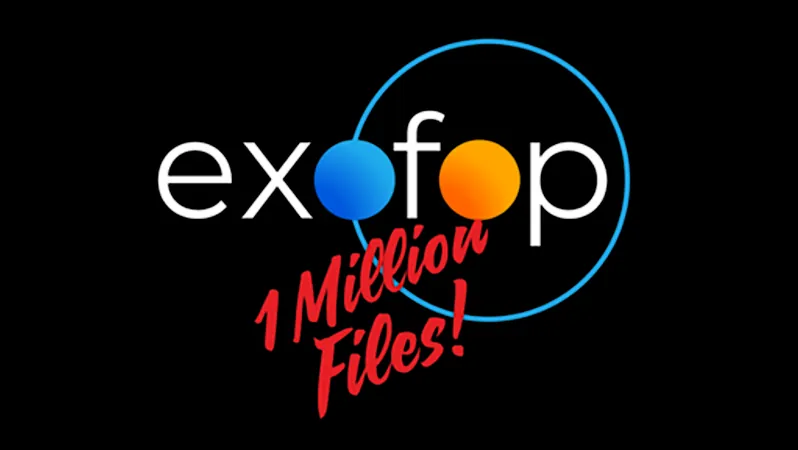
Exoplanet Discovery Database ExoFOP Hits 1 Million Files—A Game Changer for Astronomy!
2025-06-15
Author: Emma
ExoFOP: A Collaborative Milestone in Astronomy
In a groundbreaking achievement for astronomers worldwide, the Exoplanet Follow-up Observing Program (ExoFOP) has just topped one million user-submitted data files! This remarkable milestone was reached on March 3, showcasing the collective efforts of over 1,700 researchers dedicated to unraveling the mysteries of exoplanetary systems.
Confirming exoplanets is no small feat; it's not just about one spectacular discovery moment. It involves a series of observations from various observatories, all harmonized by the scientific community. Established by the NASA Exoplanet Science Institute (NExScI), ExoFOP emerged as an essential tool for researchers to collaborate and share data, enhancing the verification process of exoplanet candidates.
From Humble Beginnings to a Million Files
Launched back in 2008 to support NASA’s Kepler mission, ExoFOP has grown exponentially, especially with the recent extensions to the Kepler mission known as K2 and collaborations with other observatories like TESS. The current tally of nearly 6,000 confirmed exoplanets is staggering, but each one has benefitted significantly from the data shared through ExoFOP.
David Ciardi, the Deputy Director of NExScI, expressed the sentiment: "This milestone exemplifies how the community is uniting to explore questions such as what lies beyond our own world and the origins of life." His assertion emphasizes that these inquiries transcend individual researchers—they belong to everyone.
A Dynamic and Growing Database
Reflecting on the evolution of ExoFOP, lead developer Megan Crane noted, "In the beginning, our database could accommodate a single exoplanet orbiting one star. We can’t help but chuckle at that now; it’s been incredible to witness ExoFOP flourish with the burgeoning influx of data and insights."
As new discoveries flood in, dealing with this vast trove of data presents challenges, but it also opens new avenues for scientific exploration. The team is excited about how user contributions are shaping the future of exoplanet research.
Embracing Open Science for Global Collaboration
Steering towards a future of open science, ExoFOP encourages astronomers to freely share their observations and analysis. Ciardi emphasized, "Today’s missions generate such immense datasets across all fields—from exoplanets to cosmology—that collaboration is essential to derive meaningful results." This unity is pivotal for advancing our understanding of the universe.
The ExoFOP platform allows astronomers to preview existing observations, enabling them to build upon collaborative work in real time. With thousands of known exoplanets and many more being identified, the efforts shared through ExoFOP are more important than ever.
A Celebration of Community and Futuristic Ambitions
After a tense wait—akin to a secret countdown towards a New Year’s celebration—the ExoFOP team joyously celebrated their milestone, rewarding prolific contributors with delightful special-edition mugs featuring smiley face planets.
Looking ahead, with new missions like ESA’s Ariel and NASA’s Habitable Worlds Observatory on the horizon, the ExoFOP team is poised to further enrich their database. Crane shared her enthusiasm: "This milestone illuminates the immense value of ExoFOP as a resource for our community, fueling the discovery and confirmation of even more exoplanets."
As we embark on an ever-expanding journey into the cosmos, the collaboration fostered by platforms like ExoFOP is set to open new horizons in our quest to understand the universe and the possibility of life beyond Earth.









 Brasil (PT)
Brasil (PT)
 Canada (EN)
Canada (EN)
 Chile (ES)
Chile (ES)
 Česko (CS)
Česko (CS)
 대한민국 (KO)
대한민국 (KO)
 España (ES)
España (ES)
 France (FR)
France (FR)
 Hong Kong (EN)
Hong Kong (EN)
 Italia (IT)
Italia (IT)
 日本 (JA)
日本 (JA)
 Magyarország (HU)
Magyarország (HU)
 Norge (NO)
Norge (NO)
 Polska (PL)
Polska (PL)
 Schweiz (DE)
Schweiz (DE)
 Singapore (EN)
Singapore (EN)
 Sverige (SV)
Sverige (SV)
 Suomi (FI)
Suomi (FI)
 Türkiye (TR)
Türkiye (TR)
 الإمارات العربية المتحدة (AR)
الإمارات العربية المتحدة (AR)